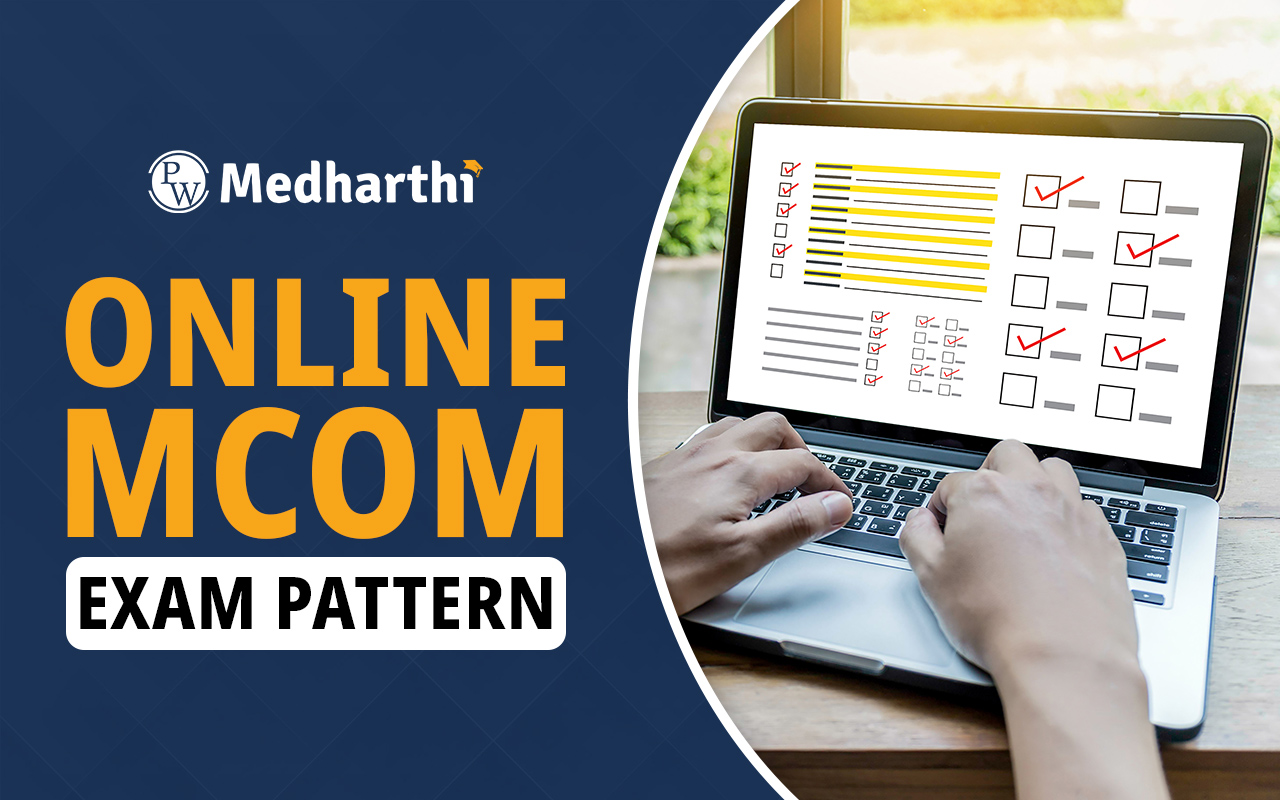
Online MCom exam pattern generally includes the use of secure digital platforms to ensure fairness and transparency during the examination. With the rapid shift towards digital learning, many institutions have adopted online examination modes to make higher education more accessible and flexible. This change has transformed the way exams are conducted generally. Further, preparation methods, assessment strategies, and other aspects are changed too with the advent of online examinations. Here, candidates can learn about Online MCom Exams Preparation, pattern, and other relevant details.
Online MCom Exam Pattern Overview
In an online MCom program, candidates can attempt exams from a location of their choice, provided they meet the technical requirements. Online MCom exam pattern aspects, such as the structure, question types, and duration, may vary from one institution to another. However, the evaluation methods focus on assessing conceptual clarity, analytical skills, and application of knowledge in real-world business and financial contexts.
Therefore, candidates who are engaged in Online MCom Exams Preparation should be aware of the examination pattern. The following table can help candidates learn about the general duration, types of questions, and marking schemes followed by most universities:
|
Online MCom Exam Pattern Overview |
|
|---|---|
|
Mode of Examination |
Online via the university’s learning management system (LMS) or proctored exam software |
|
Exam Duration |
2–3 Hours (varies by university) |
|
Question Types |
Objective (MCQs), Subjective (descriptive answers), Case Studies |
|
Marking Scheme |
Typically based on credit weightage per subject |
|
Proctoring Method |
AI-based remote proctoring or live human invigilation |
|
Frequency |
Usually, at the end of each semester or academic term |
Candidates must note that before appearing for the final examination, they are often required to complete internal assessments, assignments, or project reports. The final grades are based on the internal assignments and assessments, too. Many universities usually provide mock tests to help students get familiar with the online interface and technical requirements.
Note: The exact Online MCom Exam pattern may differ depending on the institution, program structure, and chosen specialisation. Candidates must check their universities’ official online portals.
Online MCom Exams Preparation
Candidates must be aware that Online MCom Exams Preparation may require a different approach compared to traditional pen-and-paper tests. Since the examination is conducted online, appearing candidates must be aware of the technical aspects of the platform.
Students should begin their examination preparation by reviewing the MCom syllabus first. Then, they should focus on topics that hold higher weightage in the online MCom exam pattern. Also, solving sample papers and previous year questions can help the aspirants in understanding the difficulty level and style of questions. During Online MCom Exams Preparation, candidates are required to learn time management skills to complete the examination within the given time slot. Also, aspirants should test their internet connectivity, device compatibility, and webcam/microphone setup at their end before the exam day.
Online MCom Grading System and Evaluation
The grading system in an online MCom program often combines both formative and summative assessments. Formative assessments include assignments, quizzes, and class participation, while summative assessments involve mid-term and final semester examinations.
| Online MCom Exam Grading System and Evaluation | |
|---|---|
| Component | Weightage |
| Assignments & Internal Assessments | 20% to 30% |
| Mid-term Exams | 20% to 25% |
| Final Semester Exams | 40% to 50% |
| Projects/Case Studies | 10% to 15% |
| Minimum Passing Grade | 40% to 50% |
Candidates must note that the marks obtained in different components are converted into a Grade Point Average (GPA) or Cumulative Grade Point Average (CGPA) at the end of the program. Most universities follow specific grading scales, and students must maintain the required CGPA to successfully earn the degree.
Note: The weightage distribution may vary based on the university’s academic policies and specific course structure. Candidates must confirm the grading and marks distribution policy with their university only.
| Other Related Link | |
|---|---|
| SMU Online MCom | Online Jain MCom Course |
| Online MCom Jobs | Online MCom Scope |
Online MCom exam pattern FAQs
What types of questions are asked in online MCom exams?
How is cheating prevented in online MCom exams?
Do online MCom exams have negative marking?
Can candidates appear for exams using a smartphone?
Are online MCom exams open-book?










